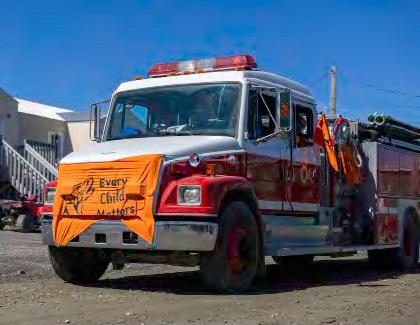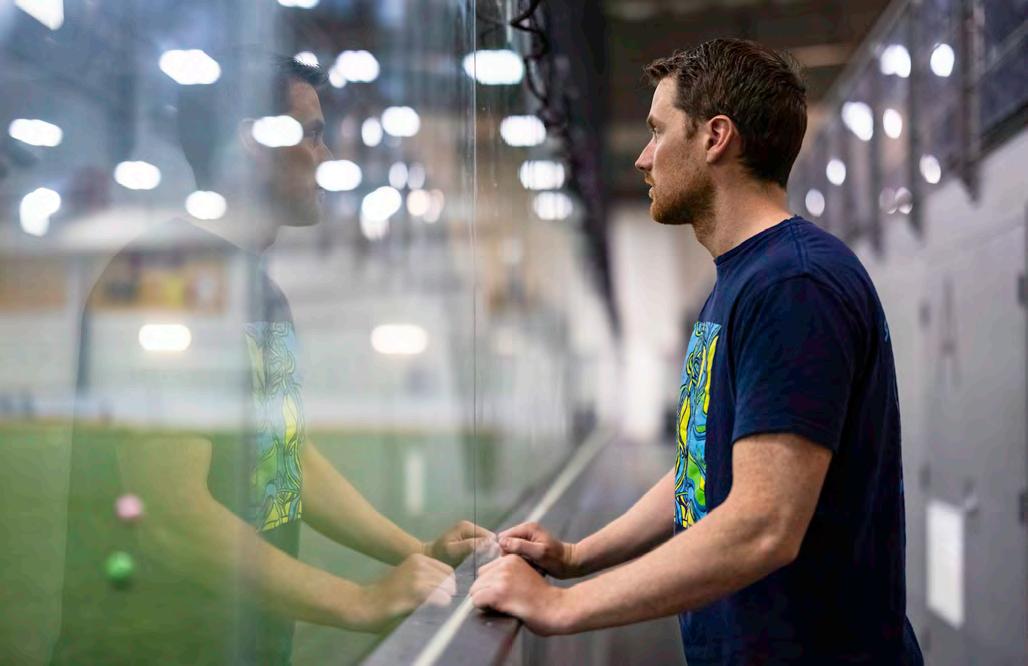
5 minute read
Dream-maker chases his own
Land use plan lands Nunavut
The Nunavut Planning Commission has completed its recommended Nunavut land use plan for approval by the Government of Nunavut.
“As minister of environment responsible for accepting the plan with the federal minister of northern affairs and the president of Nunavut Tunngavik Incorporated, I look forward to working with the three approval authorities cooperating together in the review of the 2023 Recommended Nunavut Land Use Plan,” stated Joanna Quassa in a news release June 28.
Over the next several months, the GN and approval authorities will review the plan “to make sure it protects and promotes the existing and future well-being of Inuit and Nunavummiut,” stated the release.
NTI board meets Iqaluit
The Nunavut Tunngavik Inc. board met in Iqaluit mid-June to discuss a wide range of issues including children and youth welfare, housing for Inuit and the Qanuippitaa? National Inuit Health Survey.
NTI announced that its department of social and cultural development is investigating options for Inuit-designed and led prevention services in child and family welfare in the territory, as well as recommending a shift towards a preventative service model.
“NTI is well and uniquely positioned to play a preventative role in child and youth welfare in Nunavut and can make a significantly positive impact in the lives of many Inuit,” stated the June 15 release.
The board also decided on the allocation of $422 million in funding for Inuit housing from the federal government. Sixty-seven per cent of it will go toward affordable housing initiatives for fixed-rent, non-employer-tied units. Thirty per cent will go toward supportive housing, including delivery of shelters and housing for Elders and youth. Three per cent of the funding will go toward developing and delivering homeownership-related programd and training.
“These housing initiatives are dedicated to dealing with existing housing gaps that complement the housing initiatives by the Government of Nunavut and others,” states the release.
The housing fund will be split between NTI and the three regional Inuit associations.
NTI also awarded a contract for the logistical support of the Nunavut component of the Qaniuppittaa? National Health Survey to Argyle, worth $7.9 million. The contract is to support the delivery of the Inuit health survey in every community of Nunavut over the next two years, including hiring and training Inuit regional and community coordinators, field teams, interviewers and Elders.
The next board meeting is scheduled for late August in Iqaluit.
By Stewart Burnett Northern News Services Local Journalism Initiative Rankin Inlet
Anyone who’s attended a hockey tournament in Rankin Inlet knows the passion recreation director David Clark has for his hometown and territory.
He frequently ends closing ceremonies by thanking “the best fans” of Rankin Inlet, and he was the coach to lead the U19 men’s team to the territory’s first hockey gold at the 2023 Arctic Winter Games earlier this year.
At the heart of every recreation activity or event in the Kivalliq capital is Clark, whose commitment to youth and sport is key to the heartbeat of the community.
But the 35-year-old, born-and-raised Rankinmiut is finally leaving his hometown this summer to pursue a dream of his own – one he shelved for many years as his focus was on family and his home.
“I really care about the youth in our community and giving the best opportunities for them that we can offer,” said Clark, who’s preparing to leave for a sport coaching and management program in Haaga-Helia, a university in Finland.
As he has encouraged youth to follow their dreams for years, he’s now taking his own advice.
“I talk a lot about following dreams and going after your aspirations, so I need to remember to do that myself,” said Clark. “No matter the age, it’s important for people to continue to develop and grow even in their adulthood. So many times, we get stuck in what we’re doing, and we all have goals and dreams. Who am I to say that to kids to follow their passion and follow their dreams, but yet I have my own that I’m not following?”
And this has been his dream since he was 20 years old. The university’s webpage link has been in his computer’s favourites bar ever since, and every year when applications open up, he thinks about whether the time is right to apply. Finally, it was, and after a series of interviews and assignments, he was accepted to the two-year program, which includes a third practicum year.
“I had a young family, and a lot of times, it just didn’t feel like the right time. I had a lot of prior commitments and I just didn’t feel like it was time to go,” said Clark. “But I always had it in the back of my mind, and it was always something I’ve dreamed of doing.”
He’ll be leaving this August and taking his wife and youngest son along with him.
“Getting the official news this spring was pretty overwhelming and exciting,” he said.
Part of his excitement is learning more about how Finland develops its hockey programs, as he compares the country with Nunavut in its small population but surprisingly strong hockey players.
He’ll be living in Finland from August to May, returning to Rankin Inlet for the summers.
“I made a commitment to go to this program and I’m really looking forward to it,” said Clark. “I’m most excited about learning and growing, as a coach, as a person, as a father. I’m looking forward to the new experiences and learning how they do things. I’ve always had a very strong admiration for Finnish hockey. They’re one of the hockey powers that has a very small population, so I can relate to it a lot working within Nunavut.”
With his mind always on improving Nunavut recreation and hockey, he wants to take what he learns and make hockey in the territory even better. That said, Clark is attending the program with no exact future career aspirations: he’s going in with an open mind and looking to develop himself as a person. And along with that, he hopes his absence will provide an opportunity for others to develop themselves, too.
“I know that I’m a lot better recreation director now than I was 16 years ago, and the community has allowed me to grow as a person and within my position also,” said Clark.
Despite his love for Nunavut hockey, he’s not upset to be missing the 2024 Arctic Winter Games. He says it will be an important opportunity for other coaches to grow.
“I had my chance,” he said. “I’m always going to be connected to Team Nunavut and I believe one day, I’ll be back to coach other teams, but for this year, it’s OK. I set a goal to win a gold medal with that (AWG) team, and we did it. So for me to take a step back in that role, I think it’s a good time, gives other people opportunities.”
When he first started in his position, Clark made a list – closely guarded – of goals he wanted to see for Rankin Inlet. Those included the arena, new playgrounds, soccer turf, basketball court and the aforementioned hockey gold. But there’s one more he hasn’t achieved yet: a swimming pool.

“We’re trying to make Rankin a healthy place to live and give youth and our community members recreation activities they can do to feel good about themselves and feel healthy,” he said. “You don’t have a healthy community without a healthy recreation program.”
He thanked the municipality for providing so much freedom and opportunity to grow, as well as his family, loved ones and community members for their support.
“At the end of the day, I always felt my job was to try and make Rankin a better place,” said Clark. “That’s my mindset coming into work every day.”
Nunavut Day – one of a long list of recreational activities this summer – is coming up July 9, as Clark works to the last minute before leaving in early August.
“I know I’ll be a better person for it,” he said, adding that it’s not a goodbye to Rankin, but a ‘see you later.’
“Rankin is my home. It’s always going to be my home. I’m very proud to be from here. It’s a special palace in my heart and I’ll always consider it home, and I’ll be back.”



